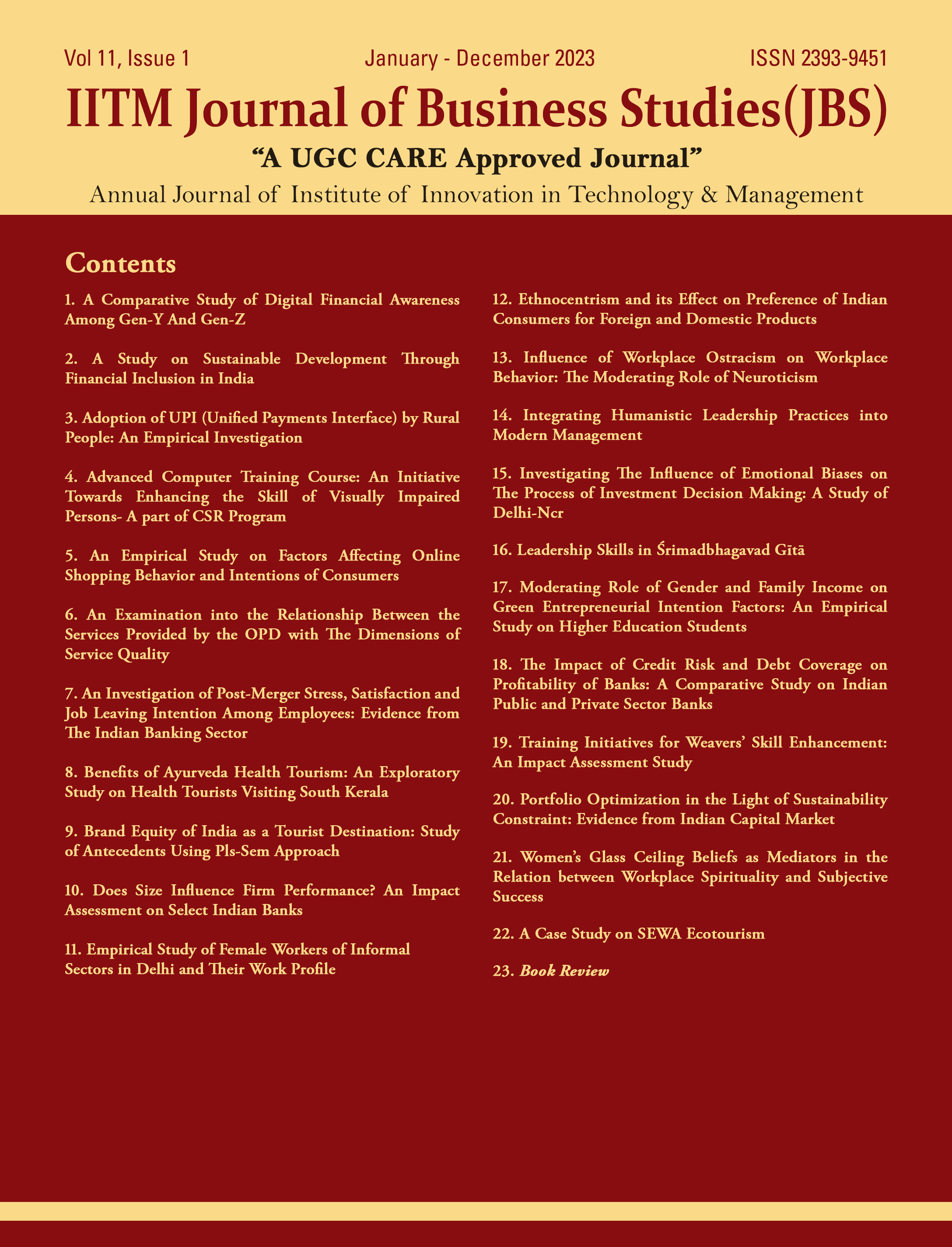A CROSS SECTIONAL STUDY ON PERCEPTION TOWARDS WELLNESS PRACTICE AMONG THE EMPLOYEES AT PRIVATE HOSPITAL
Keywords:
Perception, Wellness, Screening Test, Gender and ExperienceAbstract
Workplace wellness practices focus on lowering employee risk by providing ongoing health promotion and sickness management because they allow for frequent contact with employees through regulated environmental and communication systems, workplaces are perfect for health behaviour change. Here the researchers tried to understand the employee’s perception towards wellness practice, check the employees’ interest in different wellness practice and recommended to implement employee wellness measures in the company. A substantial amount of material was obtained and then combined and concentrated in an ethical manner in order to partially satisfy the requirements for the academic research project. This project was conducted in order to meet a component of those specifications. Apart from the guide and his student, researchers provided significant contributions to this study work, which served to make it more realistic.
References
Altwaijri, Y., AlSaqabi, D., AlSuwailem, F., Aradati, M., Bilal, L., Devo, E., Hyder, S., & Naseem, M. T. (2019). Evaluating the Impact of a Workplace Wellness Program in Saudi Arabia: An Intra Department Study. Journal of occupational and environmental medicine, 61(9), 760–766.
Arslanian-Engoren, C., Braun, L. T., Chyun, D. A., Dunbar-Jacob, J., Dunbar, S. B., Gawlik, K., Lewis, L. M. Melnyk, B. M., Melkus, G. D., Millan, A., Orsolini, L., Rice, V. H., Tan, A., & Wilbur, J. (2018). A National Study Links Nurses’ Physical and Mental Health to Medical Errors and Perceived Worksite Wellness. Journal of occupational and environmental medicine, 60(2), 126–131.
Belay, B., Harris, D., Lang, J. E., Mukhtar, Q., Mulder, L., & Onufrak, S. (2020). Prevalence of Workplace Health Practices and Policies in Hospitals: Results from the Workplace Health in America Study. American Journal of Health Promotion, 34(8), 867–875.
Blake, H., & Gartshore, E. (2016). Workplace wellness using online learning tools in a healthcare setting. Nurse education in practice, 20, 70–75.
Block, J. P., Goldman, R. E., Linakis, S. K., Roberto, C. A., Seward, M. W., & Werth, P. (2019). Showers, Culture, and Conflict Resolution: A Qualitative Study of Employees’ Perceptions of Workplace Wellness Opportunities. Journal of occupational and environmental medicine, 61(10), 829–835.
Bulova, J. A., Colby, S. E., Eubanks, J. W., & Person, A. L. (2010). Barriers to participation in a worksite wellness program. Nutrition research and practice, 4(2), 149–154.
Chinoy, G., Duncan, A. D., Liechty, J. M., Miller, C., & Ricciardi, R. (2011). Employee use and perceived benefit of a complementary and alternative medicine wellness clinic at a major military hospital: evaluation of a pilot program. Journal of alternative and complementary medicine (New York, N.Y.), 17(9), 809–815.
DeVoe, J., Norsen, L., Pesis-Katz, I., Singh, R., & Smith, J. A. (2020). Reducing Cardiovascular Disease Risk for Employees Through Participation in a Wellness Program. Population health management, 23(3), 212–219.
El-Banna, M., Kurnat-Thoma, E., Oakcrum, M., & Tyroler, J. (2017). Nurses’ health promoting lifestyle behaviors in a community hospital. Applied nursing research: ANR, 35, 77–81. 10. Estabrook, B., Lemon, S. C.& Zapka, J. (2012). Evaluating the Implementation of a Hospital Work Site Obesity Prevention Intervention: Applying the RE-AIM Framework. Health Promotion Practice, 13(2), 190–197.
Evanoff, B. A., Eyler, A. A., Herrick, C., Kinghorn, A. M., Purnell, J. Q. & Strickland, J. R. (2015). Enhancing workplace wellness efforts to reduce obesity: a qualitative study of low-wage workers in St Louis, Missouri, 2013-2014. Preventing chronic disease, 12, E67.
Flannery, K., & Resnick, B. (2014). Nursing assistants’ response to participation in the pilot worksite heart health improvement project (WHHIP): a qualitative study. Journal of community health nursing, 31(1), 49–60.
Goforth, M., Keenan, K. A., Large, V. & Trau, D. (2016). Nature Contacts: Employee Wellness in Healthcare. HERD: Health Environments Research & Design Journal, 9(3), 47–62. 14. Gregory, S. T., Gregory, B. T., & Menser, T. (2018). An Organizational Intervention to Reduce Physician Burnout. Journal of healthcare management / American College of Healthcare Executives, 63(5), 338–352.
Howard-Ruben, J., Medland, J., & Whitaker, E. (2004). Fostering psychosocial wellness in oncology nurses: addressing burnout and social support in the workplace. Oncology nursing forum, 31(1), 47–54. 16. Meier, N., Swint, C. &White, C. H. (2021). The Implementation of a Stress Management Program for Health Care Workers Through a Rural Occupational Health Clinic. Workplace Health & Safety, 69(4), 161–167.
Morgan, R. O., Pompeii, L. A., Sharma, S., Sianez, M. & Upadhyaya, M. & (2020). Obesity Prevention Worksite Wellness Interventions for Health Care Workers: A Narrative Review. Workplace health & safety, 68(1), 32–49.
Motley, D. L., & Prelip, M. (2011). Assessing Hospital Employee’s Readiness for Change for a Workplace Wellness Program. Californian Journal of Health Promotion, 9(2), 95-106.
Van Kirk M. L. (2021). Employee Wellness Pilot Program. Workplace health & safety, 69(5), 192–197.
Motley, D. L.; Prelip, M. Assessing Hospital Employee’s Readiness for Change for a Workplace Wellness Program. CALIF J HEALTH PROMOT 2011, 9, 95-106.
Jessica Ann Boulova, Ashley Lynne Person, Sarah Elizabeth Colby, Janie Whitehurst Eubanks Barriers to participation in a worksite wellness program, Nutrition Research and Practice 4(2) 2010:149-54 22. Strickland JR, Eyler AA, Purnell JQ, Kinghorn AM, Herrick C, Evanoff BA. Enhancing Workplace Wellness Efforts to Reduce Obesity: A Qualitative Study of Low-Wage Workers in St Louis, Missouri, 2013–2014. Prev Chronic Dis 2015;

